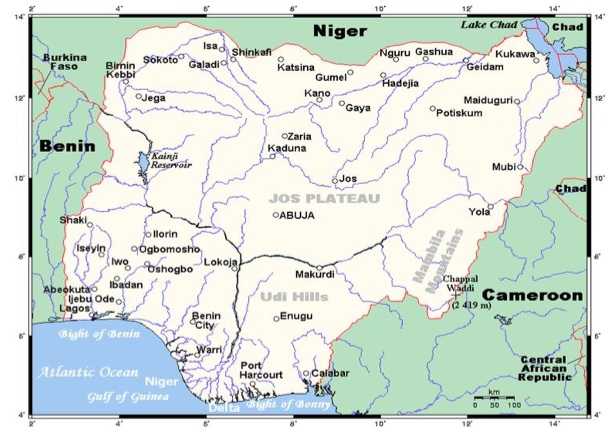
By Atâyi Babs
The winner of Nigeria’s March 28 presidential election, General Muhammadu Buhari has declared his readiness to radically confront global issues such as climate change and terrorism affecting the country. The President-elect in his acceptance speech on Wednesday, promised to make addressing global warming a priority when he assumes power on the 29th of May 2015.
General Muhammadu Buhari while confirming that his government would play a more active role in diplomatic efforts to craft a global response to climate change stated “I assure all foreign governments that Nigeria will become a more forceful and constructive player in the global fight against terrorism and in other matters of collective concern, such as the fight against drugs, climate change, financial fraud, communicable diseases and other issues requiring global response.”
Come May 29th, Gen Buhari will replace outgoing President Goodluck Jonathan as the fourth President in Nigeria’s fourth republic after defeating the incumbent in his fourth attempt at the polls.
A welcome development
According to Usman Inuwa, a Zonal Network Coordinator of Climate & Sustainable Development Network (CSDevNet), “this premiere presidential declaration of intent on climate change is a welcome development that will excite Nigerians to no ends as the country presently wobbles under insufficient support for climate change efforts, deficit of political will, and insufficient clarity of intent.”
“Regulatory reforms, policies, related national development plans and investment priorities are non-existent, where they exist, lack of strategic coherence and official denunciation reign supreme. A case in point is the Climate Change Commission bill still awaiting presidential assent after two years of uncommon legislative virility, Usman added.”
Decrying the present situation of things, the civil society coalition coordinator revealed that “relevant agencies of government concerned with the Environment still struggle with governance and coordination ocassioned by limited transparency and accountability, poor stakeholder participation, and alignment.”
Climate change in Nigeria
Accelerated climatic changes are expected to lead to potentially large impacts across Africa, including Nigeria, in the future. The scale of climate change will increase with high anthropogenic emissions, greenhouse gas (GHG) concentration, and average global temperature.
Climate models suggest that Africa’s climate will generally become more variable, with high levels of uncertainty regarding climate projections in the Africa Sahel zone. Evidences indicate that the world has already warmed by 0.8oC since the pre-industrial era. According to IPCC, temperatures in West Africa, and particularly the Sahel, have increased more sharply than the global trend, and the average predicted rise in temperature between 1980/99 and 2080/99 is between 3°C and 4°C, which is more than 1.5 times the average global trend.
For Nigeria, it has been shown that a possible sea level rise from 1990 levels to 0.3 m by 2020 and 1m by 2050, and

rise in temperature of up to 3.2°C by 2050 under a high climate change scenario has been predicted. The low estimate predictions are for sea level rise of 0.1 m and 0.2 m by 2020 and 2050 respectively, and a temperature increase of 0.4 to 1°C over the same time periods. Sea level rise of 1m could result in loss of about three-quarters of the land area of Niger Delta.
All of these have serious environmental and economic implications and call for urgent and well-targeted actions to minimize the potential disasters that could attend a full-scale climate change.
Accelerated climatic changes are expected with large impacts across Africa. The scale of the change will increase with greater greenhouse gases (GHG) emissions, and global temperature. For Nigeria, there could be significant sea level rise from the 1990 levels to 0.3 m by 2020 and 1m by 2050. There could also be rise in temperature of up to 3.2°C by 2050 under a high climate change scenario. All of these have serious environmental and economic implications and call for urgent and targeted actions to minimize the impacts of the change.
The country has considerable challenges with its land resources including loss of prime arable lands, opening up of the remaining new land, vegetation degradation and increasing desertification. The proportion of people living in rural areas is rapidly declining, while urban areas are rapidly expanding, taking up more and more of the adjoining rural lands all of which will influence climate change.
The Nigeria’s coastal and marine environment stretches for about 853 km, about 15km in Lagos area, 150km in the Niger Delta and about 25km east of the delta. It has about 25% of the country’s population and a wide variety of economic opportunities and resources. Oil is got from the region and this brings about 90% of the country’s foreign exchange earnings.
Contributing to global warming
In 2006 Nigeria’s population stood at 140.43 million with a national growth rate of 3.2% per annum. At that growth rate, the population by projection would double in size in just 24 years. This huge population puts tremendous pressure on the environment and makes Nigeria a high potential contributor to global warming. A majority of Nigeria’s more than 140 million as at 2006 live below the poverty line and have limited or no access to basic amenities.
Nigeria has a developing economy. Its strength is derived from its oil and gas reserves, which make up 90% of export revenues, 78% of Government revenues, and 38.8% of the Gross Domestic Product (GDP).The country’s agriculture is dominated by small holdings with limited mechanization. These give low productivity and make the country to depend on import to meet its food demand.
Nigeria is endowed with energy resources like crude oil, natural gas, coal, tar sand, and biomass. However, production is inefficient and inadequate. Nigeria’s is one of the least energy-efficient economies in the world with per capita consumption of 138 kg of oil equivalent.
Gas flaring and inefficient energy use play significant roles in Nigeria’s GHG emissions. Private production of electricity with diesel- and petrol operated generators is significant but comes at a higher cost per unit. Limited access to reasonably priced electricity is a key factor of low standard of living in the country.
Fuel wood is the main source of domestic energy in the country and is increasing despite the fact that wood extraction has known damaging effect on plant cover. Nigeria has the highest rate of deforestation in Africa (FAO, 2005), which is increasing due to factors like settlement expansion and logging. The remaining forests could disappear by 2020. The country must thus invest in forestry, encourage use of alternatives to wood and continue to protect the remaining forests.
Floods are becoming more frequent environmental challenge due to heavier and higher intensity rainfall. Other factors like poor watershed management, rapid urbanization, and blockages of drainage channels are worsening the incidences and impacts. Environmental pollution is also an environmental challenge and is linked to a reasonable extent to poor waste management particularly in the urban areas.
All these characteristics of the national environment can accentuate the local impacts of climate change. If well managed however, they could reduce vulnerability to climate change impact and make effective coping and adaptation possible.












Comments 1